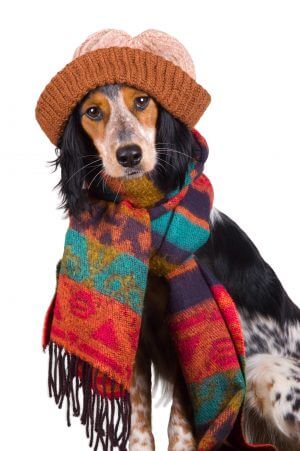You might be wondering what special precautions you should take for your dogs in cold weather as freezing temperatures quickly approach. Older puppies occasionally require assistance staying warm when it’s chilly, especially toy or thin-coated breeds. Integrative veterinarian Dr. Julie Buzby responds to frequently asked questions about keeping dogs warm and safe during the chilly winter months.
Are you and your dog starting to give each other “the look” when it’s time to go outside this winter as the temperature drops where you live? You know, the one where you both ask, “Isn’t it too cold for this?”
Extreme temperatures and wind chill have an impact on your dog’s desire to spend time outside, just like they do on you and I. But can the cold weather harm your cherished dog as well?
Therefore, before you prepare to go outside with your dog companion, let’s look more closely at how the cold can affect them and how we can keep dogs warm in the winter.
Keep your dog as healthy as you can, regardless of his age—from puppy to senior!
 Even if you live in hot and sunny climates such as Arizona, Florida and California, the temperatures can dip and get below freezing at night. If you live in colder spots throughout the country, you and your dog may have to battle the rain, ice and cold. During the winter season, many dogs feel the cold as much as their owners do, especially when they are not used to frigid temperatures. Both puppies and older dogs are more vulnerable to colder temperatures than dogs in their prime years. Additionally, certain breeds of dogs are bred for the snow and cold. These include mastiffs, sheep dogs, Bernese mountain dogs, and Alaskan malamutes, for instance. And although your dog may have a fur coat, it does not help in the bitter cold. Know that dogs with a double coat are able to stay warmer than those with a single coat, as they lack an undercoat.
Even if you live in hot and sunny climates such as Arizona, Florida and California, the temperatures can dip and get below freezing at night. If you live in colder spots throughout the country, you and your dog may have to battle the rain, ice and cold. During the winter season, many dogs feel the cold as much as their owners do, especially when they are not used to frigid temperatures. Both puppies and older dogs are more vulnerable to colder temperatures than dogs in their prime years. Additionally, certain breeds of dogs are bred for the snow and cold. These include mastiffs, sheep dogs, Bernese mountain dogs, and Alaskan malamutes, for instance. And although your dog may have a fur coat, it does not help in the bitter cold. Know that dogs with a double coat are able to stay warmer than those with a single coat, as they lack an undercoat.
As a general rule, if the temperature outside drops below freezing, you shouldn’t let your dog spend a lot of time outside because the cold can lead to paw injuries and frostbite. If your dog has frostbite, it is necessary to visit the veterinarian immediately if its ears or tail tip are cold, hard, or white, red, or gray in color.
Sometimes I Am in Pain
As they age, dogs can experience many of the same aches and pains that affect humans. Aged dogs are actually more prone to developing arthritis, which can make it difficult for them to move around or even sit or lie down. Old injuries may suddenly become new problems as well. Your dog’s discomfort can be greatly decreased by giving them a cozy place to rest and the occasional helping hand.
I Get Frightened Sometimes
 When our dogs were younger, they may have seemed fearless and were ready to charge into any situation. Now that they have gotten older, they may be experiencing some anxiety that is common with age.
When our dogs were younger, they may have seemed fearless and were ready to charge into any situation. Now that they have gotten older, they may be experiencing some anxiety that is common with age.
When it comes to separation anxiety, this is especially true, and if they aren’t right beside you, they might worry that you aren’t there for them any longer. They may occasionally try to crawl up under your feet to get closer to you.
Give them a brief moment of comfort by giving them a light scratch behind the ears.
FAQ
Do dogs get colder with age?
In cold weather, older dogs have trouble controlling their body temperatures. All senior dogs are affected, but breeds without thick double coats have it the hardest. Fortunately, there are numerous methods you can use to keep your dog warm.
How do you know if dog is too cold?
- Shaking or shivering.
- Hunched posture with a tucked tail.
- Whining or barking.
- Change in behaviour, like seeming anxious or uncomfortable.
- Reluctance to keep walking or tries to turn around.
- Seeks places for shelter.
- Lifts paw off the ground.
What age is considered old for a dog?
When small dogs are 11–12 years old, they are regarded as senior citizens in the canine community. Their medium-sized friends become seniors at 10 years of age. Their larger-sized colleagues are seniors at 8 years of age. Additionally, at age 7, their giant-breed counterparts are seniors.
How do you keep an old dog warm?
- Warm clothing. …
- Where does your dog sleep. …
- Wrap her up! …
- Keep the bed warm. …
- Don’t let your dog freeze outside. …
- Elevate the bed off a cold floor. …
- Grooming. …
- Don’t let your dog out if she’s wet.